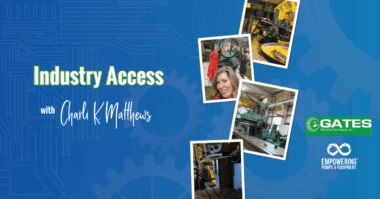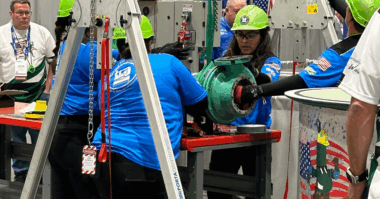Jennifer K. Muir, P.E., is the Founder and President of JKMuir, a successful women-owned and operated engineering and energy consulting firm specializing in water, wastewater, and industrial processes. Jennifer, who in 2018 became the new Chair of the Connecticut Section of AWWA, is active with several organizations, including the Hydraulic Institute and the U.S. Department of Energy – contributing as a subject matter expert on topics around energy efficiency and energy savings.
Jen has built a talented team and empowers them to have further impact – which is visible from their recent involvement with the University of Hartford to expose engineering students to pump performance testing and assessment and their educational presentations at the New England Water Environment Association Conference.
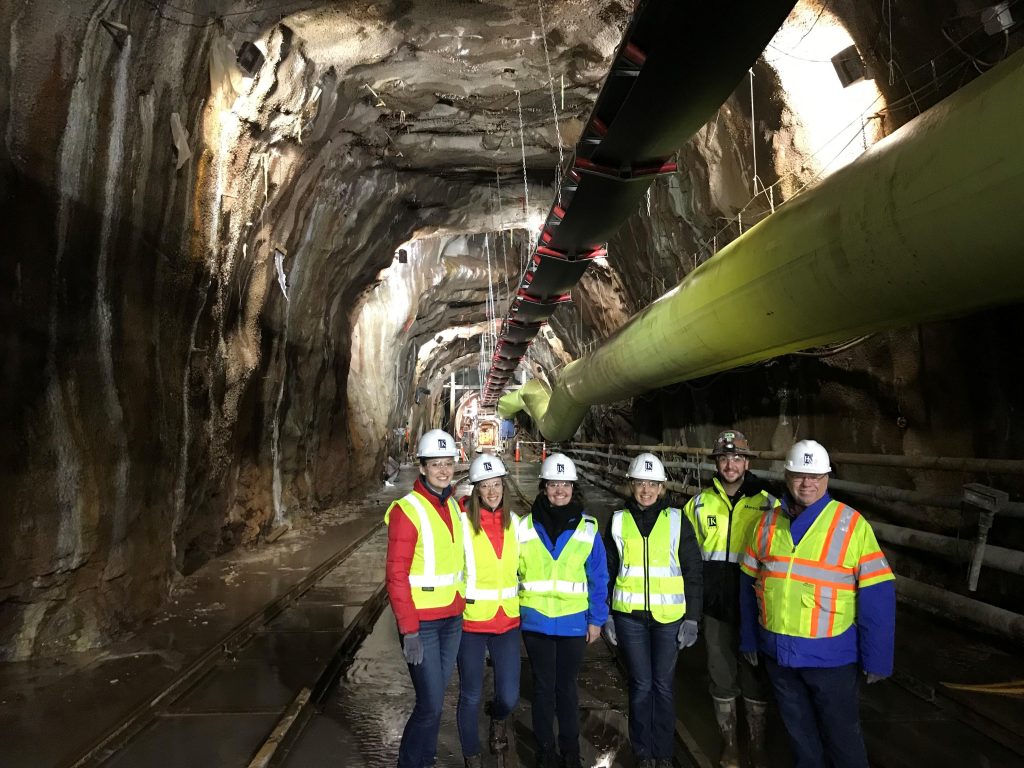
The JKMuir team visits Iris, the Hartford MDC tunnel boring machine. JKMuir provided construction inspection for the 4 mile long South Hartford Conveyance and Storage Tunnel, located 200 ft below ground.
We’re so honored to shine a light on Jen as our #PumpTalk Celebrity, as she celebrates her first decade driving a successful business.
Q: Congratulations on JKMuir’s 10 Year Anniversary! Let’s go back a bit – How did you decide to become an engineer?
Jen: I was always attracted to doing something that was very practical and with measurable results. I had an interesting experience in college where I started out as a biology major, but it turned out that biology was not the right course for me. I also had the opportunity to have a class that was taught by an actual practicing engineer that really helped me see the hands-on application of engineering – this instructor was providing info about some of the design projects he had been working on – so that really motivated me to be in the Water/Wastewater industry and to become a practicing engineer.
Q: Tell me about how you got involved with the Hydraulic Institute.
Jen: As I was progressing in my field as a Design Engineer of Water/Wastewater systems, I was involved in an industry organization where I was responsible for putting together a training seminar on energy. We had decided that the training seminar should focus on Energy Efficiency, and so this group of people told me to call this great guy who does a lot of work in the Wastewater industry. So he came and gave a talk about pump testing. I was completely enthralled by his presentation and knew right away that was what I wanted to do. Pump testing was a topic I was passionate about! It felt very practical and real – having the ability to tell what’s really happening with a pump, assessing it in the field, and to see the actual improvements that could be achieved. This kind of work, to me, was even better than doing design work because it was not planning for something that was potentially going to happen in the future, it was something that was happening “right now”. Soon thereafter, I left the engineering design consulting world to go out on my own and focus specifically on energy efficiency, and in particular, pumping systems. So as my firm grew and we were doing more and more of this kind of work, we ultimately got involved in the Hydraulic Institute because it is the international organization known for creating the standards for all types of pumping systems. The Hydraulic Institute had been doing more on addressing the efficiency of pumping systems, so as a young company who had been hiring junior level engineers to grow and learn, we were always looking for resources to get better at our craft, to have a resource where we could draw from the experiences of others, and that’s really what brought us into working more closely with the Hydraulic Institute and with Bill Livoti who has many years of experience (or as he likes to call it – ‘on the job training’). It’s really important to have a pool of resources and the Hydraulic Institute provides that place where everyone can come together and share.

(From left to right) Carina Hart, Chelsea Conlon, Jen Muir, Molly Keleher, Alex Rozen
Q: Do plants have a greater desire to become more energy efficient, and if so, what is it that is motivating them?
Jen: There are different motivations for water and wastewater facilities to become more energy efficient, and some are driven by cost savings. Everyone feels a budget crunch, whether you are a public or private entity. Depending on the area of the country, municipalities and municipal entities have seen fluctuations and increases in energy costs, and we see that creating a push toward energy efficiency. What is interesting about pumping systems, often when we talk about pumping systems optimization, the savings is coming in more than one form. When you are optimizing pumps, you are providing some level of energy savings, but you are also potentially improving the operation and reliability, decreasing downtime, etc. When a pumping system is operating more efficiently, it is operating more effectively, so there is an interesting benefit to working with pumping systems that go beyond just saving energy. But energy savings is of interest on a community / city / statewide and national level – there is an increased interest in “going green”. People are becoming more energy conscious and there is some pressure (in a good way) to move towards efficient operation because facility manager from all kinds of different plants are going to be asked to answer to their operating costs – which is going to include energy costs moving forward.
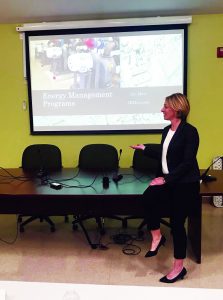
Q: How did you get involved with grants and funding for energy efficiency projects?
Jen: Going back to the financial aspect, we realize that while we may want to reduce our annual operating costs or we recognize that we could be operating things more effectively, almost everything has some element of a cost associated with doing that. Sometimes the upfront capital cost can be a deterrent to moving forward with a project – particularly in municipal applications. Many state and utility programs have established incentive programs to incentivize water / wastewater facilities to undertake projects that they not have otherwise pursued. The idea is to provide the capital cost to help them move forward or pay for the project – any project that can be shown to provide energy savings. So one of the most important things that we do is CONNECT water / wastewater or pumping projects with the available funding. A lot of times, this can really leverage funds that might be available through water / wastewater utilities rate payer funds or municipal capital budget. The question we are always posing is how can we leverage some of these outside funds for energy efficiency and start looking at capital improvement projects through an energy efficiency lens not only in order to get these grants but also to help understand the life cycle element of how certain capital improvements or system improvements might provide benefit over the long term? The challenge that water/wastewater plants have is that, while many people are aware of these state or utility run energy efficiency programs, there is a lot of ‘leg work’ that needs to be done in order to acquire the funding – and these people already have full-time jobs! So this is where we come in to support these energy efficiency projects – offering assistance to get grant applications to the right people, to provide proof of the savings that can be achieved, putting together the required documentation, and that can be a challenge for these plants because while they know there is potential to be more efficient, a lot of times, they are wondering ‘how am I going to quantify that?’ So we offer support by quantifying in a meaningful way to help maximize the incentives that are available. Providing this connection is really the most critical thing we do. By CONNECTING them to the funding programs, it creates further motivation to take on these energy efficiency improvement projects. We really need to educate the industry about the funding that is available.
Q: What excites you about the pump industry?
Jen: I’m really excited about the advancement in technology – the wireless monitoring, IoT, and the new opportunities that exist to monitor systems in real time. I see a lot of pumping system applications are lagging behind in that area, but that it’s certainly where things are going, where we will have smart systems that are making real time modifications to optimize efficiency. I’m excited about growing our role in that area, exploring ways to convince some of the state and utility programs that this enhanced monitoring creates real savings – with the hope that it then becomes something eligible for grants and funding. We really want to help accelerate the adoption of enhanced technology if we can help reduce the cost. That’s one of those little adventures we’re on right now and that’s where I see our role. We want to take the pieces the technology that others are developing and we want to see it implemented in our systems to optimize efficiency, and then show the actual cost benefit from this enhanced technology or it’s going to be very slow to adopt.
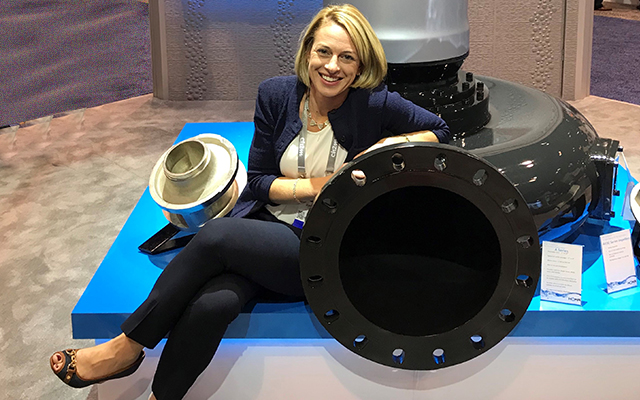
Q: Do you have any advice for someone new to the pump industry?
Jen: This industry is so necessary. The work people do in the pump industry is so essential. So critical to our way of life. Think about it – how many times is each drop of water pumped? Water gets pumped out of the ground, through treatment plants, distribution networks, back out and so on. Obviously, I’m passionate about it, but this industry is essential, critical, and a practical part of our existence. People in the pump industry have an impact in a quiet way, but we can’t do this work in a bubble. We have to be connected with the people who are developing the technology as well as users, in order to really effectively do this and be part of the progress made in the pump industry.
Thank you for all your contributions to the Water / Wastewater Industry and for being our #PumpTalk Celebrity! We look forward to celebrating your next major anniversary with you!



